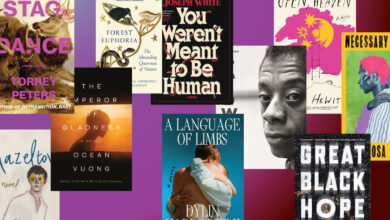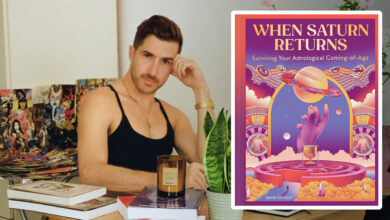Beyond Two Genders
Houstonian Gigi Raven Wilbur contributes an essay on intersex life to a new anthology.
By Tim Brookover
Over the years, Gigi Raven Wilbur has been involved with the Radical Faeries, the free-spirited movement so significant in GLBT history; the bisexuals; the transgenders; the intersex community; the spirit-sexualists; and the pagans. Wilbur is presently the coordinator of the adult campground and the sex-positive Temple of Aphrodite at Dragons Wylde Ranch, the spread located near Bastrop and operated by the Earth Spirit Alliance (www.earthspiritalliance.org), the statewide pagan nonprofit organization.
Now Wilbur, who lives in Houston, is a contributor to a trailblazing academic anthology. His essay “Walking in the Shadows: Third Gender and Spirituality,” which recounts his experience and thoughts on life as an intersex person, is included in the new Trans/forming Feminisms: Transfeminist Voices Speak Out, published by the Sumach Press, the Canadian feminist publisher. The 30 essays in the 256-page book, edited by scholar Krista Scott-Dixon, reflect “the complex intersections” of transsexualism and feminism. Besides Wilbur’s contribution, the volume features pieces by renowned North American and European activists and scholars in the field.
Soon after Trans/forming was published, I asked for a preview from Wilbur, who writes a column for the pagan publication Rogue Moon (in his PlanetOut “Bi Focus” column, the bisexual writer and film critic Michael Szymanski dubbed Wilbur “the ultra-cool pagan”).
Tim Brookover: Can you summarize your essay in Trans/forming feminisms ?
Gigi Raven Wilbur: Intersex (hermaphrodism) is defined as “a range of anatomical conditions in which an individual’s anatomy mixes key masculine anatomy with key feminine anatomy.” In the essay, I cover emotional components, moral implications, spiritual elements, and the gender mysteries of being a hermaphrodite. Some of these issues overlap with transsexual issues.
In the transgender community, there is a concept of passing. Within a binary gender system, being able to pass as a different gender may seem healthy and good. The truth is that passing is propagating the myth of a binary gender system. It is a lie and is unhealthy. When we can see gender as a spectrum, then we can be the gender we are and celebrate in our diversity. It takes the value system out of gender and helps us move away from rigid gender stereotypes.
The question is raised about our birthright to be the gender we are born. Does any other person or group of people have the right to change another’s gender without informed consent? Since my birth gender was altered shortly after I was born, I discuss some of the ramifications of those actions. I was sent out to the world altered to look like a male, was not informed of this, and was punished, beaten, and abused because I could not be a male or live up to others’ expectations of what a male is. No wonder I had problems. I was not born male. Cosmetic surgery between my legs will not change my neurological wiring, my brain chemistry, nor my internal functioning. It would not change my bone structure nor my gender identification. It could not change my psychological makeup.
This would later have impact on my life choices. When I started dating, my partners were not getting the lie the doctors created in my body. I am not a male, yet they expected a male from the illusion created by sex reassignment surgery. To this day, I cannot throw a ball like a boy; my shoulder is intersex, not male. Emotionally, I am built as a hermaphrodite, not as a male. Spiritually, I have never been comfortable with a male body, nor would I have been with a female body. I am hermaphrodite. That is my true gender.
Should I try to live this lie, or should I be what I was born to be? For me, the answer came through spiritual means. I discovered the pagan path and the ancient roles that hermaphrodites played in ancient societies. In the article, I discuss my role as a prostitute priestess and as a sex healer. I also discuss some of my attributes that provide me with the gifts that help qualify me in this role. This is the path that the ancients provided for hermaphrodites.
At the end of the article, I discuss how rigid gender roles and stereotypes are harmful for all people. By learning that gender is a spectrum, not a binary system, we can all break free of gender roles and stereotypes. We can all develop into fully functioning human beings without the boundaries imposed by classifications and prejudice.
What is the message that you want readers to take away from your essay?
There are several messages that are important. In the essay, I bring up the issue that common medical practice today is in the business of eradicating the gender of all humans that are not distinctly male or female. If people are born intersex, they routinely undergo sex-reassignment surgery shortly after birth. True gender is not a binary system; there are more than two genders that exist. We should be allowed to be the gender that we are born with. It is estimated that around 1 out of 2,000 babies is born with an intersex condition. With the population in the billions, there are a lot of intersex individuals in the world today.
I feel that the concept of passing is destructive, both for those who cannot pass and for those who can pass. It establishes and reinforces gender roles and stereotypes. It sets a judgmental standard that is arbitrary and ill defined. A healthy approach is to recognize the full spectrum of gender, which is already present in the GLBT community. We see butch women and effeminate men. Perhaps it is time to reset the standards to fit what nature has created—a full spectrum of gender.
In ancient society, not only was third gender recognized, but there was also a role and a place for third gender within the social structure. We were the shamen, the medicine men, and the healers. With the eradication of third gender, we have no recognition in modern society. I, for one, am working to reclaim my role as a prostitute priestess and a healer. As a community, we can reclaim our function in society as hermaphrodites, transsexuals, and gender-variant individuals.
Sex is spiritual. In a sex-negative society, sex is considered evil. Unfortunately, we all live in a sex-negative society where sex is objectified. One of the consequences of living in a sex-negative society is that we repress and deny our sexual needs and desires. We become wounded on a psychosexual level. By creating sex-positive environments, we are able to start the healing process and learn to celebrate ourselves as sexual beings. We can reclaim sex as a sacred act.
As people learn more about the complexity of gender, we can step away from rigid gender roles and stereotypes, allowing people to develop, independent of gender, into fully actualized human beings.
Aren’t you working on a book on that subject?
I have been working on it off and on for the last two years. The title of the book is Human Sexuality and Sacred Sex: A Non-Dualist Perspective. Currently, I am involved in several other projects, which has not allowed me to work on the book for the past few months. Soon I will be completing these projects and will resume writing. In the book, I have developed a new approach to sexual development, which I call sexual actualization. This is a term that I came up with from Maslow’s term, self actualization. In the book, I explore many of our modern-day sexual myths and taboos, how they can impact our lives in negative ways, and how to break these myths and taboos to become fully sexual actualized human beings and bring spiritual sexuality back into practice.
How about community involvement these days? Are you involved with any local organizations and the Radical Faeries?
My main work with community involvement is with running the Sacred Sex Temple [at Dragons Wylde Ranch]. I am focused on that work. I am very active in the pagan community.
Unfortunately, the Radical Faeries have been in a slump for the past two years. I put on a Radical Faerie event from time to time, but we have had very little turnout. I do hope we can rekindle interest and get the group active again.
I am also involved with an online intersex community and active with an online bisexual community.
What are you most looking forward to in 2008?
I would like to finish writing my book and get it published. I would like to see us shift from a sex-negative society to a sex-positive society, especially in the GLBT community. I would like to see alternative communities form bridges and connections with one another. I have been involved in many alternative communities, which include the gay community, the bisexual community, the intersex community, the transgender community, the BDSM [bondage and discipline/sado-masochistic] community, the pagan community, the art community, the Burning Man community, and several women’s movements. At this stage, each community is an island unto itself. While there is some interaction between different alternative communities, it is very limited. I would like to see more alternative communities forming bonds and doing some joint projects. We do have a lot to learn from one another, and I feel that we can become stronger if we form bridges.
As the queer community, what should we be doing in 2008 to make life better for us all?
Develop a sex-positive environment within our groups and the places that we gather together.
_____________________________
Got a comment?—feedback@outsmartmagazine.com.










